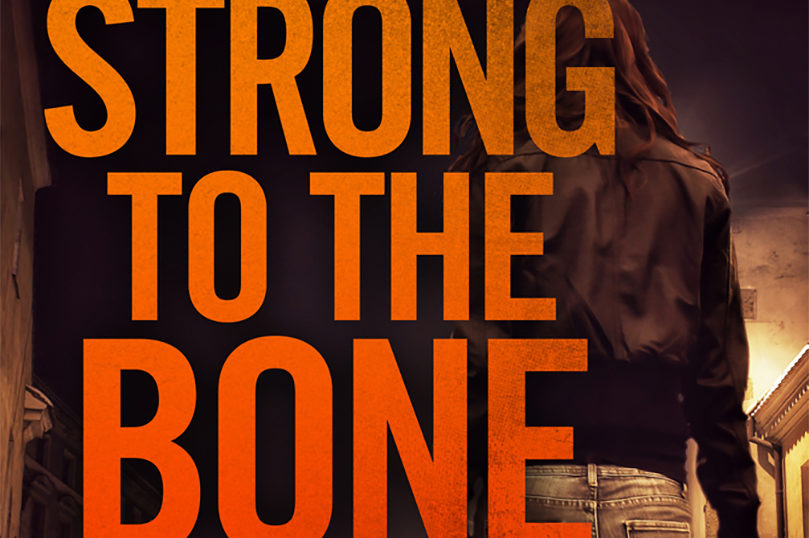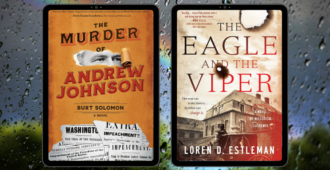opens in a new window opens in a new window
opens in a new window opens in a new window
opens in a new window opens in a new window
opens in a new window opens in a new window
opens in a new window
To prevent an unspeakable cataclysm, Caitlin and Cort Wesley must win a war the world thought was over.
Strong to the Bone will become available December 5th. Please enjoy this excerpt.
PROLOGUE
But leave us the Rangers to guard us still
Nor think that they cost too dear;
For their faithful watch over vale and hill
Gives our loved ones naught to fear.FROM COWBOY SONGS AND OTHER FRONTIER BALLADS, COLLECTED BY JOHN A. LOMAX, THE MACMILLAN COMPANY, 1918
Hearne, Texas; 1944
“Thanks for coming, sir.”
“I ain’t no sir, son,” Earl Strong told Captain Bo Lowry, just inside the mud-drenched fence line of the prisoner-of-war camp that had been erected amid the scrub brush and flat lands that dominated Hearne, Texas. “Call me ‘Ranger,’ ’cause a Texas Ranger is what I am.”
Lowry looked up, squinting into the sun to better look Earl in the eye. “My daddy was in Sweetwater back in the oil boom days of the thirties. He’s told me stories about you, how you tamed all the lawlessness out of that town all by yourself.”
“Well, sir, I did have me a time.”
“I’m not a sir, either, Ranger,” Lowry said, looking down now. “’Least ways, not anymore, since I got sent home with a bum leg.”
“Where you serve your country don’t matter, long as you’re serving it. That makes you deserving of the respect, even if it wasn’t for that whole mag of bullets you took trying to break out of the beachhead in Anzio.”
“Well,” Lowry said, shyly, “it wasn’t a whole mag.”
Earl laid a callused hand on Lowry’s shoulder. “Close enough is what I heard, Captain, all the time while you were saving a whole bunch of your men.”
“Tall tale, Ranger, that’s all.”
“I’m just relating the short of it. My captain filled me in before he sent me up here.”
“What else did he tell you?”
“That one of the Nazi prisoners you’re holding here escaped.”
Lowry nodded, as if that’s exactly what he’d expected Earl to say. “Well, there is that, plus a whole lot more, too.”
“He kill any of your men in the process?”
“Not my men,” Captain Lowry said, his voice strangely noncommittal, “no.”
Earl Strong had made the hundred and fifty mile drive from San Antonio up here to Camp Hearne straight from his meeting with Company Captain Tanner Lejeune. The town of Hearne wasn’t technically part of his patrol, but technicalities still meant little to the Texas Rangers, and ever since his experiences in Sweetwater in 1933, Earl had found himself dispatched all over the state when the need arose. The same had been true for his father, William Ray, and grandfather Steeldust Jack, legends many times over who’d done their Ranger duty from one side of the state to the other. Steeldust Jack had died just before Earl was born at the turn of the century. But his father had regaled Earl with stories of the man’s heroism, first as part of the Texas Brigade during the Civil War at the Battle of Second Manassas and Gettysburg and then as a Texas Ranger battling the likes of John D. Rockefeller.
The long ride gave him the opportunity to reflect on what he knew of Camp Hearne beyond what Captain Lejeune had told him. Like the fact that following the surrender of General Erwin Rommel’s Afrika Korps in April of 1943, the United States found itself in possession of more than 150,000 enemy soldiers, nearly half of which ended up being settled in seventy prisoner-of-war camps right here in Texas, twice as many as any other state.
He’d been told that the reason why Texas became such a popular location for German POWs was the Geneva Convention required them to be moved to a climate similar to the one in which they were captured. Rommel’s troops, stationed in North Africa, would’ve been ill prepared to survive harsh winters, making Texas the ideal home for them. And the flat terrain made it easier to spot any attempted escapes. Larger camps tended to be near more sizable towns, while smaller ones dotted the rural landscapes like oil wells.
Hearne, Texas was home to one of the larger camps, housing 4,800 prisoners. Shortly after Pearl Harbor, the citizens of Hearne lobbied their congressman to secure it, out of both patriotic loyalty and a sense of duty. The Army Corps of Engineers scoped out the town and liked what they saw. The land was acquired and by the summer of 1943, Camp Hearne was open for business, the prisoners arriving via an endless succession of Pullman trains Earl had greeted himself on more than one occasion.
There was a double fence around the entire camp, the exterior one topped with barbed wire, that included the headquarters building, hospital, and three separate compounds housing prisoners. Each compound was separated from the adjacent one by separate fencing, bracketed by watchtowers manned by machine gun–wielding guards. The buildings themselves had the typical look of standard military barracks, long and narrow, their sloped roofs covered by tarpaper or corrugated sheet iron. To handle the excess amount of prisoners continuing to pour off the trains, smaller shanty-like huts had been erected, featuring canvas roofs held up by matching posts that made them look like glorified tents.
As Earl Strong fell into step alongside Captain Lowry toward a cluster of those rapidly erected huts, he saw guards patrolling the camp both on foot and in weather-beaten Jeeps. Earl had heard that soldiers were assigned this duty due either to wounds suffered that kept them from returning to combat, like Bo Lowry, or because they’d been deemed unfit for combat in the first place.
“Is it true what I heard about the non-Nazi and Nazi prisoners coming to blows from time to time?” Earl asked the captain.
“Plenty worse than that. And since the initial outbreak of hostilities, the pro-Nazi forces have pretty much consolidated their hold on power. Reason we’ve had so little trouble since is that their officers really do rule with an iron fist. They do the camp organizing, settle disputes, partition the work details, and pretty much enforce order. But none of them has much to say about Gunther Haut.”
“Who?”
“The Nazi who escaped early this morning, not three weeks after he got here. This was where he lived the whole time,” Lowry said, stopping just before the closed flap of one of the tented shacks.
“And that would be the prisoner I’m here about.”
Lowry parted the white canvas flap and bid Earl Strong to enter. “Actually, you’re here about the three men he killed before he jumped ship.”
“We ain’t touched a thing,” Lowry continued, trailing Earl Strong into the shack that still smelled of fresh pine timber, now battling the stench of death, “except to cover the bodies after they were found during a routine check before breakfast. We got MPs on staff, but they don’t have much experience with this sort of stuff.”
“Then it’s a good thing I do,” Earl Strong told him.
He figured the temperature inside the uninsulated structure was already approaching a hundred, likely to climb another twenty degrees under the early summer, high Texas sun. Four cots occupied the bulk of the floor space, each with a footlocker squeezed beneath it. A small potbellied stove took up the bulk of the remaining floor space, cold to the touch since it would be several months before it was fired up. Just walking about made for a tight squeeze, but Earl didn’t have to walk anywhere to size up what had happened.
The sheets covering the bodies of the three dead Germans were mottled with dark, drying blood up where he judged the heads must be. He figured Gunther Haut had cut the throats of his three bunkmates as they slept before making his way off into the night, not morning, barely twelve hours ago now, Earl confirmed, after pulling back all three sheets to inspect the bodies.
“We figure he stole a knife from the mess hall,” Lowry explained, following the Ranger’s line of thought.
“Are any of your prisoners assigned to construction details?” Earl asked, aware of the cheap labor they provided to local farmers as well as state road crews.
“They’re paid wages on the order of eighty cents per day.” Lowry nodded. “Gets deposited into a fund that supports operational expenses.”
Earl pointed toward the wound on the nearest dead man’s throat from which pools of blood had spouted and dried. “Because these cuts are jagged. Could’ve been a screwdriver or chisel, if sharpened properly. I’ve come across similar killings inside prisons.”
He eyed the one unoccupied cot, its sheet rolled over a blanket that was tucked tightly into the mattress, revealing a discoloration in the steel frame.
“See that? Looks to me like Haut stole a tool from a work crew, or maybe another prisoner, and filed it sharp as he could right there. Hard to say exactly what it was, and I guess it don’t matter much now.”
“Haut was assigned to crews building the new inmate structures over in the south yard.”
“That explains it then. But it don’t explain why he killed his bunkmates, Captain. What can you tell me about the man?”
“I’ve got his file in my office. He was a Waffen-SS officer attached to Rommel’s brigade cadre, the Reich’s eyes and ears.”
“You said he’d been here three weeks.”
“Give or take. Not a lot of time to make the kind of enemies that require killing.”
“We can assume he had his reasons, Captain, and that those reasons got something to do with his escape.” Earl ran his eyes over the three bodies again, then moved to cover up the one he’d examined closer. “There was no struggle involved here, not even the pretext of self-defense. He murdered his three fellow Germans in their sleep, when he could’ve just made his way off into the night with none of them being any the wiser.”
Lowry followed the sweep of the Ranger’s gaze, trying to reconcile his words with the assumptions he’d wrongly formulated. That the murders could be explained away by a man simply wanting to cover his tracks, make sure no one tried to stop him, or alerted the camp guards as to his absence.
“Had Haut been acquainted with these men previous to coming here?” Earl asked him.
“It’s possible, but there’s no evidence of it. Like I said, we’ve got more than our share of pro-Nazi versus anti-Nazi conflict among the prisoners, but near as we can tell all four of these men were Nazis to the core and committed to the cause. We separated the two groups out and do our best to keep them segregated now. But the Nazis still run things, make no mistake about it. I told you that, too.”
“I thought you run things, Captain.”
“I keep order, Ranger, I don’t keep charge.”
“All the same,” Earl told Lowry, “there haven’t been a whole lot of escapes from camps like this. I heard it told that, more times than not, escapees end up flagging down a guard or peace officer sent on their trail to bring them back. One fellow was picked up while walking down the side of a main road loudly singing German marching songs. Another escapee was treed by a Brahman bull, quite relieved to return to his life as a prisoner of war upon his rescue. Three more prisoners were caught heading down the Brazos River on some kind of raft, hoping to float back to Germany.”
Earl was pretty sure Captain Lowry knew those tales as well as he did, and he might have detailed a few more, had not a slight bulge on the side of one of the covered bodies claimed his attention.
“Now, what we got here . . .”
He eased back the sheet to reveal the victim was holding a heavy rubber mallet, quite capable of bashing in a man’s skull, in his death grip.
“Have a look, Captain.”
Lowry did just that. “What you make of this, Ranger?”
“Man don’t take a mallet to bed, lest he fears he might not see the morning. Yes, sir, he was scared of something for sure.”
“Haut?”
“That would be my guess.”
Before Lowry could respond, a man wearing a private’s uniform barged into the tented shack and approached him, still fighting to get his breath back. He spoke nervously in a hushed tone, and Lowry swung back to Earl Strong before the private had finished.
“You’ll have to excuse me, Ranger.”
The private followed Lowry out of the tent, and Earl watched them stride quickly across the mud drying in the streaming sunlight toward a half-dozen men dressed in dark suits, sodden by the humidity. They all wore fancy hats, and Earl followed Captain Lowry’s boots kicking up flecks of what looked like dried clay in their wake, as the shortest of the suited figures stepped out to meet him. The man held his small hands on his hips, maintaining a rigid stature Earl most closely associated with European royalty.
Lowry was clearly deferring to the man as they exchanged words, pointing a few times toward the tented shack in which Earl still stood. He wasn’t much for lip reading, but was pretty sure the short man mouthed Texas Ranger, followed by a clearly derisive, even dismissive, shake of his head.
That was all it took for Earl to move from the tented shack into the blistering sunlight, the clay-like ground feeling like beach sand beneath his boots.
“That’s right,” he said, when he reached the group. “I’m a Texas Ranger, for sure.”
Earl addressed that remark to the short man, the subordinates clinging to him, as if attached by rope.
“Well, then, Ranger,” greeted the man, who looked somehow familiar, “let me respectfully inform you that your services are no longer needed here.”
Captain Lowry cleared his throat, hoping to dispel the tension that had settled over the scene. “Ranger Strong, this is—”
“J. Edgar Hoover,” the short man said, extending his hand this time, “director of the Federal Bureau of Investigation. Pleased to meet you.”
West Houston, 1999
The head emergency room nurse at Kingwood Medical Center handed Dr. Lester Franks a steel clipboard, catching him an instant before he drew back the sheet to check the next patient on the list.
“I think you’ll want to bump this one to the head of the class,” she said, a look of concern drawn over her features.
He lifted his eyes from the initial exam report after a single glance. “Rape?”
“By all indications. Victim hasn’t said much but that’s what the physical evidence suggests.”
Franks gazed down again. “She was drugged?”
“We got that much out of her. I’ve already drawn blood and sent it out to be tested.”
“Don’t hold your breath,” Franks cautioned. “If it’s GHB, or another from the date rape family, it probably won’t show up.”
He followed Nurse Rogers to the cubicle where the victim had been placed, but stopped short of drawing back the curtain. “I need you with me on this one.”
Nurse Rogers nodded, something in the gesture telling Franks she was coming in regardless.
“I don’t see a name here,” he said, after consulting the admitting exam report once again.
“She hasn’t given us one yet. Like I told you, she hasn’t said much of anything.”
Franks eased back the curtain slowly, so as not to further stress the victim’s already frayed nerves. “I’m Dr. Franks, ma’am. I believe you’ve already met Nurse Rogers.”
The young woman was sitting up on the edge of the gurney, her jeans dirty and shirt torn. Her long, wavy black hair was mussed and grime rode both sides of her face in streaks left by the tears riding her cheeks beneath a glassy gaze. She was tall, even without the well-worn boots she was wearing, and had a complexion that looked vaguely Latino.
Franks stopped a yard from the young woman’s bedside, keeping his distance. “I’d like to examine you, ma’am, then order up some tests and X-rays, but I’d like a better idea of what happened first. If you were attacked, we’re required to notify the police, but we can hold off on that for a while anyway.”
“My father,” the young woman muttered.
“What was that?”
“Call my father.”
“Glad to, ma’am. But let’s start with a name, your name.”
“Caitlin,” the young woman said. “Caitlin Strong.”
Copyright © 2017 by Jon Land
Order Your Copy
opens in a new window opens in a new window
opens in a new window opens in a new window
opens in a new window opens in a new window
opens in a new window opens in a new window
opens in a new window







